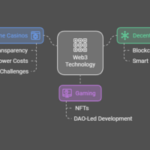Introduction
As of 2024, the internet is often criticized for being an extremely “centralized” space. Companies like Google, Apple, Facebook (now Meta), Amazon, and Microsoft—commonly referred to as GAFAM—have accumulated vast amounts of user data. This centralization has concentrated information, capital, and power in the hands of a few corporations.
In response to this centralization, the concept of “Web3” has emerged as both a philosophy and a technology aimed at decentralization. Web3 advocates for a decentralized management of information, directly challenging the centralized nature of the modern internet. Furthermore, technologies such as blockchain and smart contracts are already available to make Web3’s philosophy a reality.
However, Web3 is still in its infancy. While the concept is intriguing, its adoption remains limited.
This article explores the background of Web3, its current challenges, and examines whether online casinos could serve as a catalyst for its widespread adoption.
The Appeal of Web3
Web3 is a vision for a decentralized, user-centric internet powered by blockchain technology. It offers several key benefits:
1. Transparency and Fairness
Web3 enables tamper-resistant transactions and contracts. By using smart contracts, predefined conditions are automatically enforced, fostering trust between users.
2. Seamless Global Transactions
Cryptocurrencies facilitate smooth cross-border payments, drastically reducing fees and processing times compared to traditional banking systems.
3. New Business Models
Technologies underpinning Web3 enable innovative models such as token economies and DAOs (Decentralized Autonomous Organizations). These can revolutionize industries, including online casinos, by enhancing trust and operational efficiency.
Web3’s features address critical challenges in business, such as trust, payment systems, and international operations.
Why Web3 Adoption Faces Challenges
Despite its potential, Web3 adoption is hindered by several factors:
1. Lack of Awareness and Psychological Barriers
- Fear of the Unknown: For many, Web3 remains an unfamiliar concept, sparking anxiety and mistrust.
- Perceived Complexity: The technology is often seen as too complicated, discouraging the average user from engaging.
2. Challenges of Decentralized Power
- Resistance to Change: The idea of decentralization, while idealistic, is unappealing to those already holding significant power or seeking to climb the societal ladder.
- Gap Between Ideals and Reality: While equality is a noble goal, it may conflict with the motivations of competitive individuals, who may view a decentralized society as inconvenient.
3. Web3’s Image in Japan
- Association with Elitism: In Japan, Web3 is often perceived as a niche interest dominated by “high-minded” individuals.
4. Overcoming Barriers
- Creating Accessibility: Web3 needs to become more user-friendly and accessible to gain mainstream traction.
- Demonstrating Practicality: Communicating the practical benefits of Web3 technology is essential for wider acceptance.
Web3’s potential lies in addressing these challenges head-on and demonstrating its value.
How Online Casinos Could Boost Web3 Adoption
I believe online casinos have the potential to be a game-changer for Web3 adoption. Here’s why:
Learning from the Past
- Web1.0: The widespread adoption of Web1.0 was fueled by adult content (videos and images).
- Web2.0: Dating apps were pivotal in accelerating Web2.0 adoption.
These examples suggest that fundamental human desires often drive early adoption of new internet technologies.
Web3’s Synergy with Online Casinos
Web3’s key features align well with the needs of online casinos:
- Decentralized Management: Decentralization reduces operational costs for casino operators, allowing for better returns to players (e.g., higher RTPs) or more attractive promotions.
- DeFi Payments: Decentralized finance eliminates the burden of managing payment systems.
Addressing Key Issues
For online casinos to thrive in a Web3 environment, appropriate regulations are crucial:
- Combatting Addiction: Measures to address gambling addiction must be implemented.
- Preventing Money Laundering: Proper monitoring and regulations are essential.
Conclusion
Web3 is a promising technology with a compelling philosophy, but significant barriers hinder its adoption. Awareness gaps, perceived complexity, and resistance to decentralization are key challenges.
However, practical applications like online casinos could pave the way for Web3’s mainstream acceptance. With appropriate regulatory frameworks and measures in place, online casinos could showcase Web3’s potential, demonstrating its efficiency and trustworthiness. Ultimately, Web3 has the potential to reshape industries and build a fairer, more efficient society.



